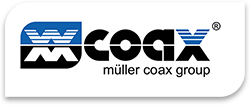

müller co-ax gmbh is presenting the latest version of the FMX series: The FMX 2.0, a valve with a very compact design and a high flow rate. With a new material configuration in stainless steel or aluminum and an improved pressure range of up to 40 bar, müller co-ax gmbh has developed a valve that can now be used not only with oil, but also with oxygen, hydrogen, ammonia, or methanol. This opens up new areas of application. The FMX 2.0 can now be used not only in machine and plant construction, but also in steam sterilization, vacuum packaging technology, and hydrogen applications, such as electrolysis.
The FMX 2.0 is characterized above all by its small and compact design and high flow rate. Combining these two properties is the ultimate in valve construction. As the inventor of the coaxial design, müller co-ax gmbh has a clear competitive advantage in this field. In this valve, the medium flows along the valve axis and opening and closing is achieved by axial movement of the valve tube. The valve is thus pressure-equalized and only the friction of the seal and spring force affect the switching process.
Regardless of whether vacuum or pressure is applied to the system, the pressure-equalized FMX valves save enormous amounts of compressed air and costs per stroke. Moreover, the valve size is the same regardless of the pressure level. The pneumatic valve drive is integrated into the housing in an extremely space-saving manner due to its coaxial position, which means that the valve is particularly suited to limited installation spaces.
The increased pressure range of up to 40 bar and the temperature range of -40° to +85° make the valve a great solution for the hydrogen sector. In addition, our materials are resistant to hydrogen, which means that there is no hydrogen embrittlement. The valves are used in electrolysis plants in an oil- and grease-free version and are suitable for use with both hydrogen and oxygen. This means that fewer replacement items are needed.
The small and lightweight FMX valves with a high KV value and low pressure loss are suitable for applications with many switching cycles, such as those in the packaging industry.
Regardless of the size and volume of the item to be vacuum-packed, the cover film of the product can be very quickly filled with oxygen and then vacuum-packed. For the food industry, abrasion-resistant sealing materials, lubricants, and materials are used. The small pneumatic drive enables ultra fast process speeds, which remain constant even after many millions of switching cycles. No maintenance is needed. Customers benefit from low air consumption per stroke at a pressure of just 4 bar, which lowers operating costs.
In an autoclave, materials and instruments are sterilized using steam. The pressurized steam kills microorganisms, viruses, and spores. The FMX 2.0 series can optionally be made entirely of stainless steel (1.4404). This means that hot media and disinfectants applied on the outside cannot harm the stainless steel valve housing. The compact and streamlined design makes it easy to clean the exterior of the valves.
Chemical bonded hydrogen in the form of liquid ammonia or methanol can be transported easily and without loss over large distances and in large quantities. Müller coax has been working with these media for over 60 years and provides process-safe solutions. Because of the materials used for the housing and seals, the FMX series is resistant to these media and is suitable for use as a switching valve for fuel cells based on methanol or ammonia, for example.
The valves’ small and compact design makes them ideal for installation in confined spaces, such as housings and machine enclosures. When used as a module or strip solution, the FMX series impresses with half the fittings, pipes, and installation time.

